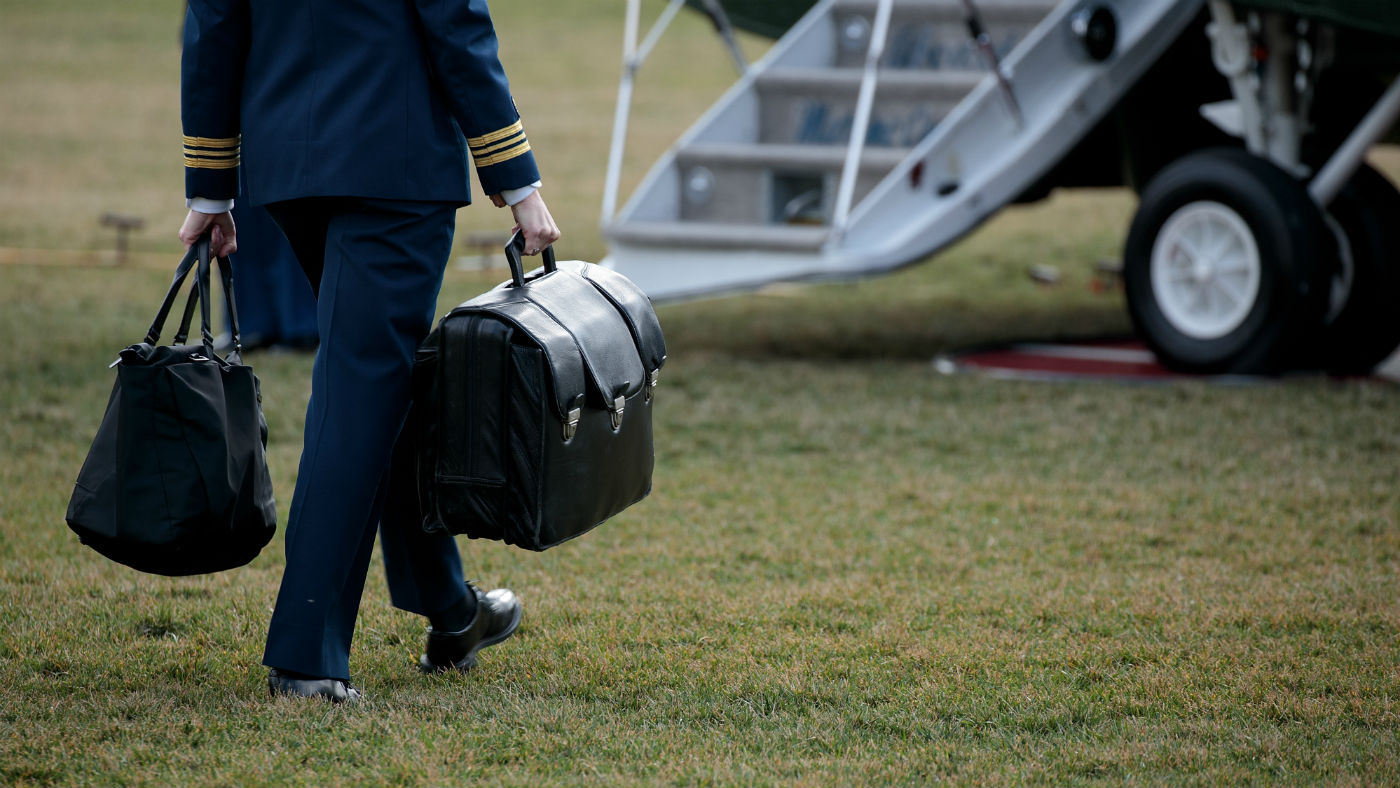Who controls the US nuclear button?
Generals say they would refuse ‘illegal’ presidential order but the Senate is looking at new safeguards

A free daily email with the biggest news stories of the day – and the best features from TheWeek.com
You are now subscribed
Your newsletter sign-up was successful
Concern over North Korea’s nuclear programme and Donald Trump’s emotional stability has led to the US president’s authority to launch a nuclear attack being seriously challenged for the first time in more than four decades.
As commander-in-chief, “the president has the sole authority to order a nuclear a strike [and] while existing procedures call for the president to consult first with military and civilian leaders, the final decision rests with him”, says USA Today.
Now, in a move not seen since 1976, congressional hearings are questioning the president’s authority to order the use of the US nuclear arsenal.
The Week
Escape your echo chamber. Get the facts behind the news, plus analysis from multiple perspectives.

Sign up for The Week's Free Newsletters
From our morning news briefing to a weekly Good News Newsletter, get the best of The Week delivered directly to your inbox.
From our morning news briefing to a weekly Good News Newsletter, get the best of The Week delivered directly to your inbox.
Republican Bob Corker, chairman of the foreign relations committee and a strong critic of the president, opened the hearing by confirming: “The president has the sole authority to give that order, whether we are responding to a nuclear attack or not. Once that order is given and verified, there is no way to revoke it.”
Stressing he “would not support changes that would reduce our deterrence of adversaries or reassurance of our allies”, Corker said he “would like to explore, as our predecessors in the House did 41 years ago, the realities of this system”.
Democrat Chris Murphy went further, saying: “We are concerned that the president is so unstable, is so volatile, has a decision-making process that is so quixotic, that he might order a nuclear-weapons strike that is wildly out of step with US national-security interests.”
The debate over presidential authority has so far divided the Senate. Some members agree Trump might irresponsibly order a nuclear strike, while “others said he must have the authority to act without meddling from lawyers”, reports the BBC.
A free daily email with the biggest news stories of the day – and the best features from TheWeek.com
CNN says the administration is trying to “soothe concerns by arguing the existing launch process that presidents have operated under for decades has sufficient checks in place that would discourage Trump from taking imprudent action”.
However, the broadcaster also reports that despite Trump receiving multiple briefings on the nuclear launch cycle and more conventional, non-nuclear alternatives, at least one “Nato partner country” has raised concerns about his command of the US nuclear launch system.
Addressing the committee this week, General Robert Kehler, head of US Strategic Command from 2011 to 2013, said he would refuse a presidential order to carry out a nuclear first strike he thought was “illegal”.
The question of legality is linked to “requirements of proportionality and necessity under the law of armed conflict”, says The Guardian. This means a presidential order could be ignored if it was expected to cause undue widespread human suffering when other, less dramatic military options, were available.
Peter Feaver, professor of political science and public policy at Duke University, told the BBC a presidential order “requires personnel at all levels” to sign it off, meaning it would be vetted by lawyers as well as the secretary of defence and military officials.
“The president cannot by himself push a button and cause missiles to fly,” he added.
Bruce Blair, a former nuclear launch control officer who is now a researcher at Princeton University, disagreed. “There are really no checks and balances,” he told the Los Angeles Times.
All Trump needs do is call in the military officer who carries the “nuclear football” - the bulky briefcase containing the nuclear codes - and work through a brief procedure to transmit launch orders to US Strategic Command, he said, adding: “The presidency has become a nuclear monarchy.”
The lack of accountability led Democratic Senator Edward Markey to propose legislation require a congressional declaration of war before a president could authorise a first-use nuclear strike.
Under current protocol, “there is no secret alternative chain of command in place”, says CNN. “The military would treat Trump as they would any other president ordering a nuclear strike. To do otherwise would be considered treasonous.”
-
 The environmental cost of GLP-1s
The environmental cost of GLP-1sThe explainer Producing the drugs is a dirty process
-
 Greenland’s capital becomes ground zero for the country’s diplomatic straits
Greenland’s capital becomes ground zero for the country’s diplomatic straitsIN THE SPOTLIGHT A flurry of new consular activity in Nuuk shows how important Greenland has become to Europeans’ anxiety about American imperialism
-
 ‘This is something that happens all too often’
‘This is something that happens all too often’Instant Opinion Opinion, comment and editorials of the day
-
 New START: the final US-Russia nuclear treaty about to expire
New START: the final US-Russia nuclear treaty about to expireThe Explainer The last agreement between Washington and Moscow expires within weeks
-
 Would Europe defend Greenland from US aggression?
Would Europe defend Greenland from US aggression?Today’s Big Question ‘Mildness’ of EU pushback against Trump provocation ‘illustrates the bind Europe finds itself in’
-
 Greenland, Colombia, Cuba: where is Donald Trump eyeing up next?
Greenland, Colombia, Cuba: where is Donald Trump eyeing up next?Today's Big Question Ousting Venezuela’s leader could embolden the US administration to exert its dominance elsewhere
-
 The history of US nuclear weapons on UK soil
The history of US nuclear weapons on UK soilThe Explainer Arrangement has led to protests and dangerous mishaps
-
 Did Trump just end the US-Europe alliance?
Did Trump just end the US-Europe alliance?Today's Big Question New US national security policy drops ‘grenade’ on Europe and should serve as ‘the mother of all wake-up calls’
-
 Trump peace deal: an offer Zelenskyy can’t refuse?
Trump peace deal: an offer Zelenskyy can’t refuse?Today’s Big Question ‘Unpalatable’ US plan may strengthen embattled Ukrainian president at home
-
 Vladimir Putin’s ‘nuclear tsunami’ missile
Vladimir Putin’s ‘nuclear tsunami’ missileThe Explainer Russian president has boasted that there is no way to intercept the new weapon
-
 Russia’s war games and the threat to Nato
Russia’s war games and the threat to NatoIn depth Incursion into Poland and Zapad 2025 exercises seen as a test for Europe